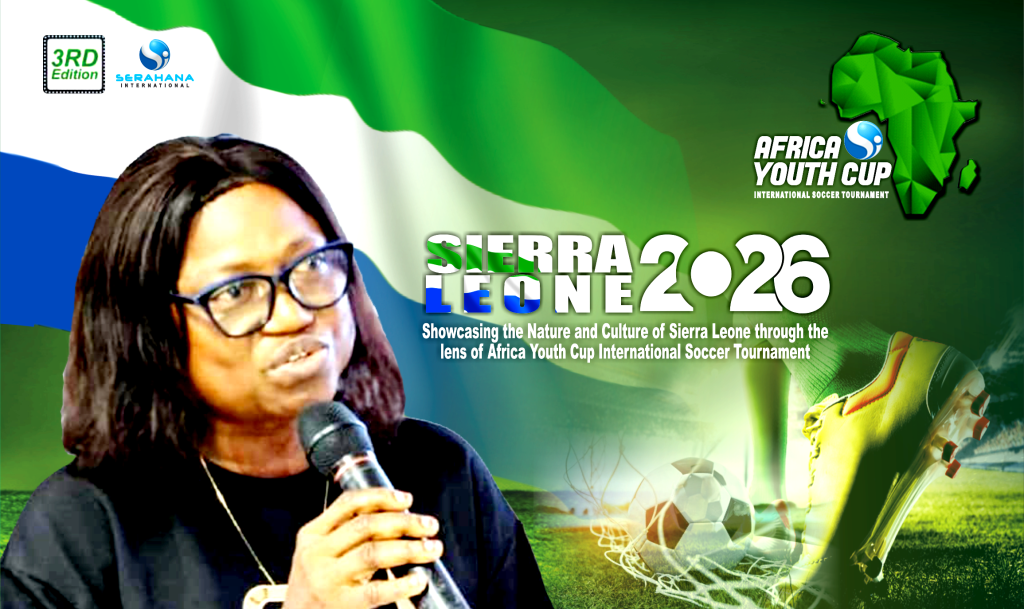Sierra Leone’s Sports Minister, Madam Augusta Teima, hailed for her leadership at the Africa Youth Cup inaugural official meeting

In Sierra Leone, football is more than a game. It is a unifying language, a source of national pride and a pathway for young people dreaming of brighter futures. This week, the Honourable Minister of Sports, Madam Augusta Teima, reminded the continent of just how powerful that vision can be when she took part in high-level sports virtual meeting with the organisers of the AFRICA YOUTH CUP, one of Africa’s fastest-growing football development tournaments.

The discussions centred on Sierra Leone’s bid to host the third edition of the AFRICA YOUTH CUP in 2026, and Madam Teima’s presence at the virtual meeting has sparked admiration across the country and beyond. For many observers, her proactive leadership signals not just an interest in football, but a broader commitment to youth empowerment, cultural exchange/promotion and Sierra Leone’s place on the African/global stage. Showcasing the Nature and Culture of Sierra Leone through the lens of Africa Youth Cup International Soccer Tournament.
A Minister with a family-centered vision: when Madam Teima spoke during the meeting, her words carried the tone of a parent who sees every Sierra Leonean child as her own: “Sierra Leone is prepared to welcome the AFRICA YOUTH CUP because we believe in the talent of our youth and the role of sports in shaping their future.”

Her statement resonated with families across the country, many of whom see sports as a way out of hardship. In communities from Freetown to Kenema, young boys and girls play barefoot football on dusty fields, cheered on by parents who believe that talent, if nurtured, can open doors to education, travel and opportunity. To the Sierra Leonean families, the prospect of an international tournament arriving on Sierra Leone is not just about football, it is about hope for the future.
Nevertheless, driving culture and identity through football, would enhance the process of healing from the scars of civil war and public health crises for Sierra Leone as a nation, because football has often been a cultural glue and unifier.
The AFRICA YOUTH CUP, if hosted in the country, would bring together young athletes, sport enthusiasts and stakeholders from across the continent and the globe, showcasing Sierra Leone’s hospitality, food, culture, SMEs, entertainment sector and traditions to an international audience. A multiplying socioeconomic impact will be engendered, as local businesses from market women selling cassava bread near stadium gates to young entrepreneurs running digital sports platforms and hoteliers, would stand to benefit economically.
The tournament could also highlight Sierra Leone’s growing arts, crafts, fashion scenes and other creative subsectors. Imagine match days infused with traditional drumming, colourful attire and local cuisine, a blend of sport and culture that would allow visitors to leave with a deeper sense of Sierra Leone’s sociocultural identity.
On the frontline of politics, leadership and continental image, the honourable Minister’s leadership is a bold statement of Sierra Leone’s readiness to engage with African/world through the AFRICA YOUTH CUP tournament. Her pledge to work with the Minister of Tourism, Minister of Youth, the Sierra Leone’s Football Federation President and other relevant authorities, reflects a full-swing of Sierra Leone’s government support for the hosting of the AFRICA YOUTH CUP tournament. This kind of inter-ministerial collaboration is rare in many African contexts where sports policy often remains sidelined.
By stepping into these conversations, the Sports Minister positioned Sierra Leone as a serious player in African football diplomacy. In favour of a nation not very popular in the African continental politics, hosting the AFRICA YOUTH CUP would be a chance to reshape perceptions, proving that Sierra Leone can successfully organise an event of this magnitude, while inspiring confidence in its institutions.
On societal impact beyond the pitch, the social dimensions of hosting such a tournament cannot be overstated. The AFRICA YOUTH CUP has a track record of not only identifying football talent, but also promoting education, discipline, social responsibility support and cross-cultural friendships. In Sierra Leone, where unemployment among young people remains a pressing challenge, the event could serve as a launchpad for skills/human capacity development in areas ranging from coaching and refereeing to event management and hospitality.
Moreover, the symbolic value is powerful: young people from Sierra Leone would share the pitch with peers from Nigeria, Ghana, Senegal, Morocco, South Africa, Western youth clubs sides, etc. This would revamp an assurance that their dreams are valid and their talent is competitive at a continental and global level.
The organisers of the AFRICA YOUTH CUP were quick to applaud Madam Teima’s role in the recent meeting: noting in their words that the Honourable Minister of Sports has demonstrated the kind of forward-looking leadership Africa needs; and her participation reassures that Sierra Leone is ready to provide an excellent home for the AFRICA YOUTH CUP, one that will inspire young athletes from across the continent.
Also, according to Mr. Finnex Asibor, a Sierra Leonean sports journalist and publisher of the Nature Newspaper, the Minister’s move marks a turning point. In his word “This initiative could be the giant leap forward that transforms Sierra Leone from being seen only as a participant in African football to becoming a hub for youth development across the continent.”
As discussions advance, the excitement is palpable. In villages and cities alike, the idea of Sierra Leone hosting the AFRICA YOUTH CUP would feel like a collective dream come through. This represents the possibility of sports to unite a diverse nation, showcase cultural pride and remind the world of Sierra Leone’s resilience.
Optimistically, the 2026 AFRICA YOUTH CUP would not just be another tournament. It would be a landmark moment in Sierra Leone’s history; an opportunity to tell a new story of growth, unity, tolerance and opportunity, written not only by officials and organisers but by the participating African youth who will carry the nation’s hopes onto the pitch.






